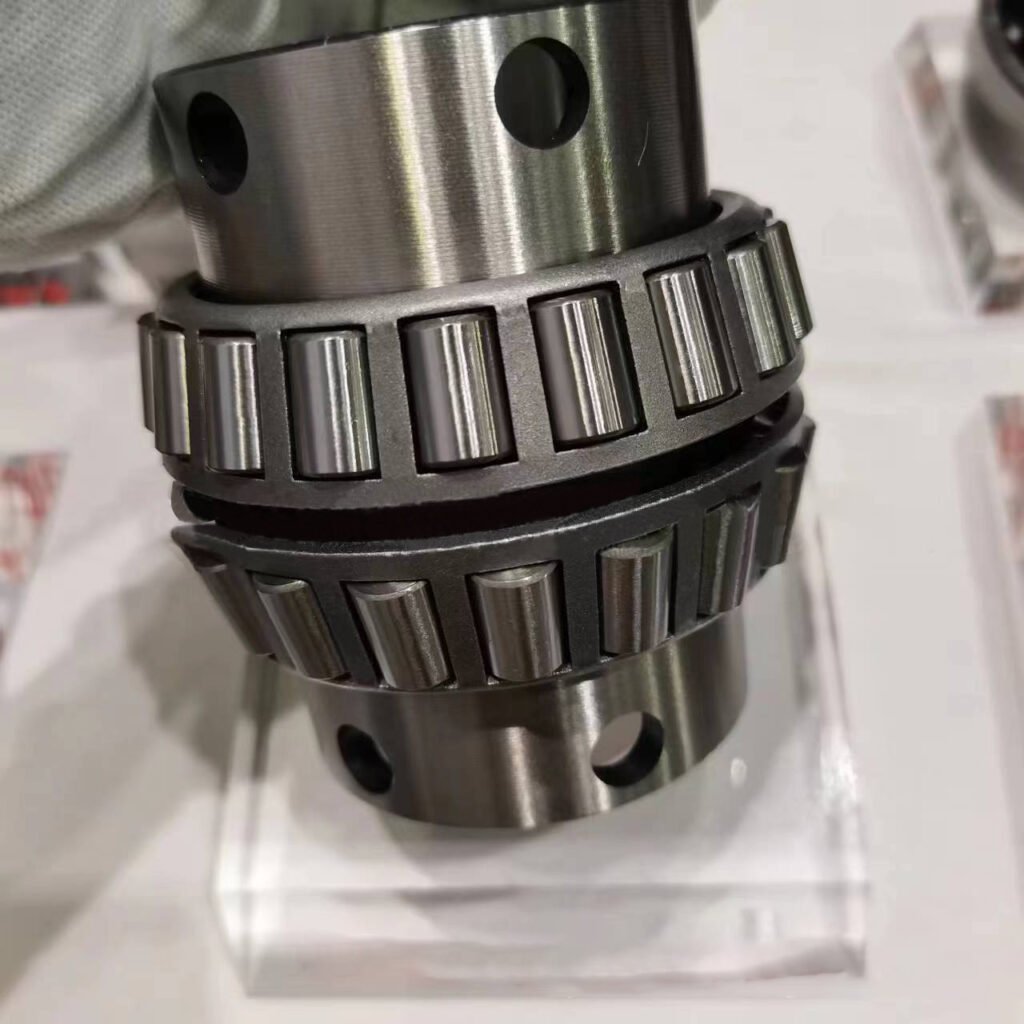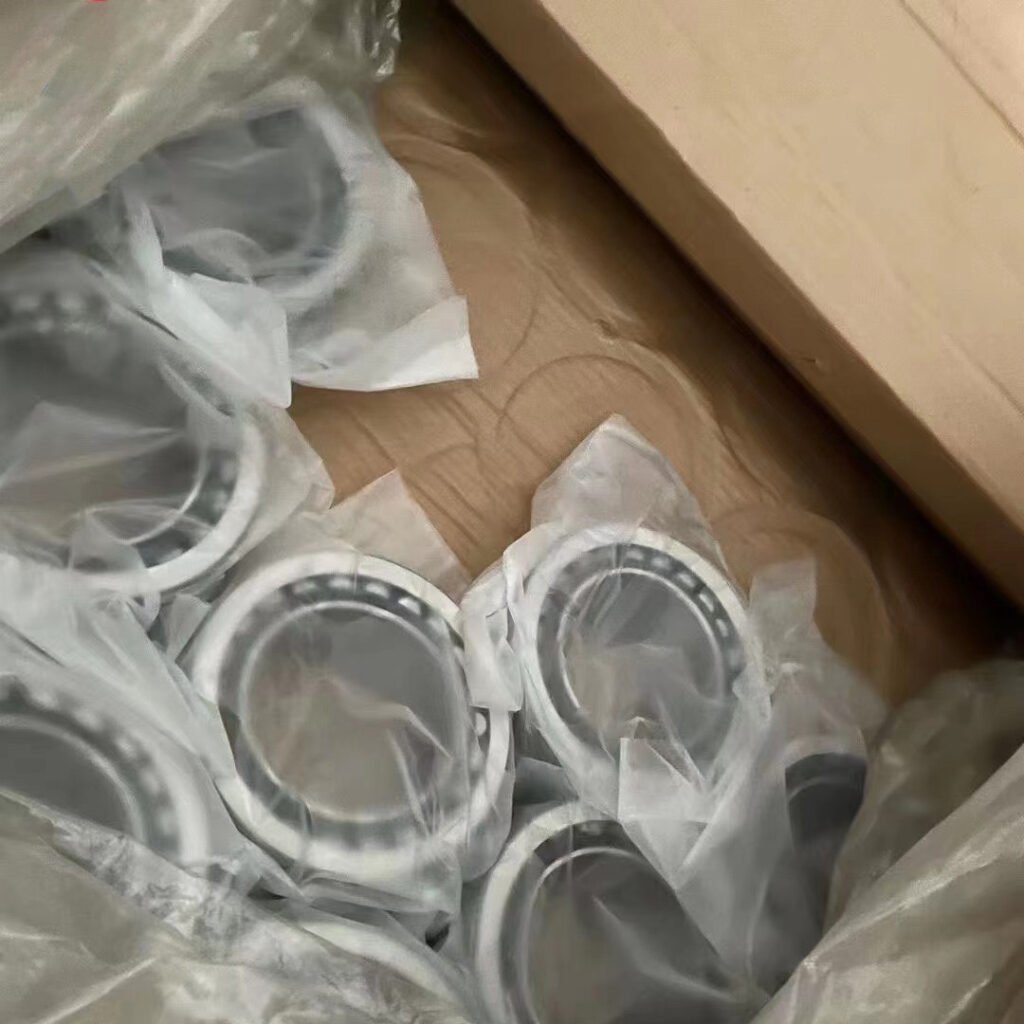











Bearings are known as the joints of machinery and are widely used in all walks of life. Due to the different working environments of machinery, the quality requirements for bearings are also very strict. VKUKEN has introduced high-end equipment from Japan, Germany and other countries for bearing production and quality control.
Bearing manufacturing is a very complex process, from raw material procurement to finished product shipment, it has to go through more than 30 processes. Understanding the bearing production process will help you control the quality of purchased products.
In many industries, due to the special environment, in order to improve the corrosion resistance, wear resistance and aesthetics of bearings, we have configured professional spraying workshops and equipment to spray the color on the bearing surface.


We are not only a strong bearing manufacturing company, but also a top design company in the bearing industry. Many of our professional engineers have worked in world-renowned bearing companies such as NTN, SKF, FAG, KOYO, TIMKEN, HRB, etc. for more than 10 years. Their superb technology has solved bearing design problems for customers in more than 20 industries.
Bearings are known as the joints of mechanical equipment and are widely used in many industries such as medical, power, agriculture, marine, industrial equipment, robotics, transportation, etc.
Want to purchase bearings for your project or become a bearing distributor in the local market? Dive into this concise guide, which is designed to simplify your bearing purchase process and provide you with the expertise you need.
Bearings are mechanical components that support rotational or linear movement, reduce friction between moving parts, and support loads. They are classified based on various criteria such as the type of motion they support, the type of load they carry, their construction, and the direction of the load they can support.
| Based on Motion | ||
| A. Radial Bearings | B. Thrust Bearings | |
| Deep Groove Ball Bearings | Cylindrical Roller Bearings | Ball Thrust Bearings**: Handle small axial loads. |
| Angular Contact Ball Bearings | Spherical Roller Bearings | Roller Thrust Bearings**: Handle large axial loads. |
| Self-aligning Ball Bearings | Tapered Roller Bearings | |
| Thrust Ball Bearings | Needle Roller Bearings | |
| Based on Load Direction | ||
| A. Radial Load Bearings | B. Axial Load Bearings | C. Combined Load Bearings |
| Deep Groove Ball Bearings | Thrust Ball Bearings | Angular Contact Ball Bearings |
| Cylindrical Roller Bearings | Thrust Roller Bearings | Tapered Roller Bearings |
| Based on Construction | ||
| A. Plain Bearings | B. Rolling Element Bearings | C. Jewel Bearings |
| Sleeve Bearings | Ball Bearings | Used in precision instruments like watches. |
| Bushings | Roller Bearings | |
| Journal Bearings | ||
| D. Fluid Bearings | E. Magnetic Bearings | |
| Hydrostatic Bearings | Active Magnetic Bearings | |
| Hydrodynamic Bearings | Passive Magnetic Bearings | |
| Based on Materials | ||
| A. Metal Bearings | B. Ceramic Bearings | C. Plastic Bearings |
| Steel Bearings | Full Ceramic Bearings | Typically made from polymers such as PTFE, Nylon, etc. |
| Stainless Steel Bearings | Hybrid Ceramic Bearings (ceramic balls with metal races) | |
| Based on Application | ||
| A. Automotive Bearings | B. Industrial Bearings | C. Aerospace Bearings |
| Wheel Bearings | Conveyor Bearings | Airframe Bearings |
| Engine Bearings | Machine Tool Bearings | Engine Bearings |
| D. Others | ||
| Construction equipment bearings | Robotics bearings | More industries…… |
| Specialty Bearings | ||
| A. Self-Aligning Bearings | B. Linear Bearings | C. Miniature Bearings |
| Self-Aligning Ball Bearings | Linear Ball Bearings | Used in small devices and instruments |
| Spherical Roller Bearings | Linear Roller Bearings | |
| D. High-Speed Bearings | E. High-Temperature Bearings | |
| Specifically designed for applications requiring high rotational speeds | Designed to operate at high temperatures | |
| Based on Sealing | ||
| A. Sealed Bearings | B. Shielded Bearings | C. Open Bearings |
| With seals to prevent contamination and retain lubrication | With metal shields to prevent large contaminants from entering the bearing | Without any seals or shields |




Stainless steel bearings offer several distinctive characteristics:
1. Corrosion Resistance 3. easy to clean 4. High Temperature 5. Low Maintenance 6. Longevity
Industries that commonly use stainless steel bearings include:
– Food and Beverage: Processing equipment, conveyor systems, packaging machinery.
– Medical and Pharmaceutical: Surgical tools, medical devices, laboratory equipment.
– Marine: Boat accessories, saltwater environments.
– Chemical: Pumps, valves, mixers handling corrosive chemicals.
– Outdoor and Agricultural: Equipment exposed to weather elements, irrigation systems.
You can also contact VKUKEN‘s professional engineers to learn more about the application knowledge of stainless steel bearings.
In order to ensure that stainless steel bearings can withstand high corrosion resistance in harsh working environments, vkuken controls from the following two aspects:
1. Material Selection: Choose high-quality stainless steel grades that are specifically formulated for corrosion resistance. AISI 304, AISI 316 or AISI 440C.
2. Our laboratory conducts chemical tests on every batch of stainless steel that the company purchases to assess whether the stainless steel meets high corrosion resistance standards.





Ceramic bearings offer unique characteristics that make them suitable for specific industrial applications:
1. High Temperature Resistance 2. Corrosion Resistance 3. Lightweight 4. High Hardness and Wear Resistance 5. Insulating Properties
Industries where ceramic bearings are commonly used include:
– Medical Equipment: Including surgical instruments, dental drills, and medical pumps where cleanliness, corrosion resistance, and reliability are essential.
– Semiconductor Manufacturing: Equipment requiring cleanroom compatibility and resistance to chemicals and high temperatures.
– Electronics: Particularly in hard disk drives, electric motors, and precision instruments where smooth operation and longevity are required.
– Due to the superior performance of ceramic bearings, they are also widely used in many fields such as mountain bike rear derailleur guide wheels, road bicycle transmission guide wheels, high-end fishing rods, etc…
Sealed bearings offer several advantages over open bearings, primarily due to their design that includes seals or shields to protect the bearing internals.
1. Contamination Prevention 2. Retained Lubrication 3. Extended Service Life 4. Reduced Maintenance 5. Improved Performance in Harsh Environments 6. Enhanced Operational Reliability 7. Ease of Installation
Sealed bearings are beneficial for industries and applications where preventing contamination and retaining lubrication are critical factors. Here are some industries that typically choose sealed bearings:
– Food and Beverage: Processing equipment, conveyor systems, and packaging machinery in food and beverage industries require bearings that prevent ingress of contaminants such as food particles, dust, and moisture.
– Medical and Pharmaceutical: Equipment used in medical devices, surgical tools, and laboratory instruments requires bearings that maintain cleanliness and prevent ingress of bodily fluids or contaminants.
– Agriculture: Farming equipment such as tractors, harvesters, and irrigation systems benefit from sealed bearings to protect against dirt, water, and agricultural chemicals.
– Mining and Construction: Heavy machinery and equipment used in mining and construction operate in dusty and dirty environments where sealed bearings help prevent abrasive particles from entering and causing premature wear.
– Automotive: Sealed bearings are used in automotive wheel hubs, transmissions, and other critical components to protect against road debris, moisture, and contaminants.
– Marine: Bearings used in marine applications, such as boat propellers and winches, require protection against saltwater corrosion and marine debris.
– Industrial Manufacturing: Equipment in manufacturing plants, including conveyor systems, pumps, and processing machinery, benefit from sealed bearings to ensure reliable operation and minimize maintenance.
Angular contact ball bearings are mainly used in machine tool spindles, high-speed motors, automotive industry, robots, aerospace and other fields.




The purpose of quenching is to change the material from ferrite to austenite, and obtain martensite through unbalanced phase transformation after rapid cooling, so as to obtain high hardness and strength.
Tempering: reheating the quenched metal to a certain temperature and cooling it down; it is a process for converting the quenched martensite structure into the tempered martensite structure after quenching.
Through these two heat treatments, the strength, hardness, wear resistance, fatigue strength and toughness of the bearing are greatly improved.
We are equipped with the most advanced quenching presses to perform quenching and tempering heat treatment on bearing rings and balls, and record the test results in detail to ensure that each parameter is within the standard value range.



| Bearing steel quenching and tempering process parameters | |||||
| Steel Grade | Quenching | Tempering | |||
| Heating temperature(°C) | cooling method | hardness(HRC) | Tempering method | hardness(HRC) | |
| 9Cr18 | 800~850(Preheat) 1060~1080 | Oil | 150~160°C 3h, Air cooling | ≥60 | |
| 9Cr18Mo | 800~850(Preheat) 1050~1100 | Oil | 150~160°C 2h~5h, Air cooling, Tempering 4 times | ≥58 | |
| GCr6 | 810~830 780~815 | Oil | 150~170°C Oil furnace uniform heating 2h~5h, Air cooling | 62~65 | |
| GCr9 | 815~830 | Oil | ≥63 | 150~170°C Oil furnace uniform heating 2h~5h, Air cooling | 62~65 |
| GCr15 | 835~850 | Oil | ≥63 | 150~170°C Oil furnace uniform heating 2h~5h, Air cooling | 61~65 |
| GCr9SiMn | 800~840 | Oil | ≥63 | 150~180°C Oil furnace uniform heating 2h~5h, Air cooling | ≥62 |
| GCr15SiMn | 820~840 | Oil | ≥63 | 150~180°C Oil furnace uniform heating 2h~5h, Air cooling | ≥62 |
| G20Cr2Ni4A | 790~810 | Oil | 160~180°C Oil furnace uniform heating 6h~12h, Air cooling | ≥58 | |
| Cr14Mo4V | 800~850(Preheat) 1100~1120 | Oil | 500~520°C 2h, Air cooling, Tempering 4 times | 61~63 | |
There is a lot of professional knowledge about bearings, and we will continue to share it. If you don’t find the answer you need on this website, please send us a message. Our professional team provides a full range of services from bearing application, selection, customization, quotation, after-sales, etc. Any of your questions will be answered within 24 hours.
* vkuken takes your privacy seriously. All information is used for technical and commercial communication only and will not be disclosed to third parties. If you are interested in more bearing technology, you can click on this article for reference.

Our team knows that every customer inquiry is very important; our professional engineers will reply to you within 24H.
“Your contact information will be kept absolutely confidential and will not be disclosed.”